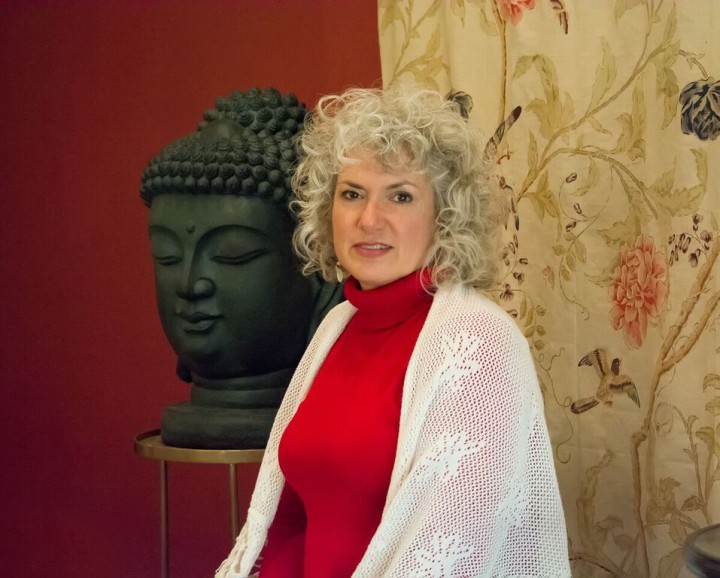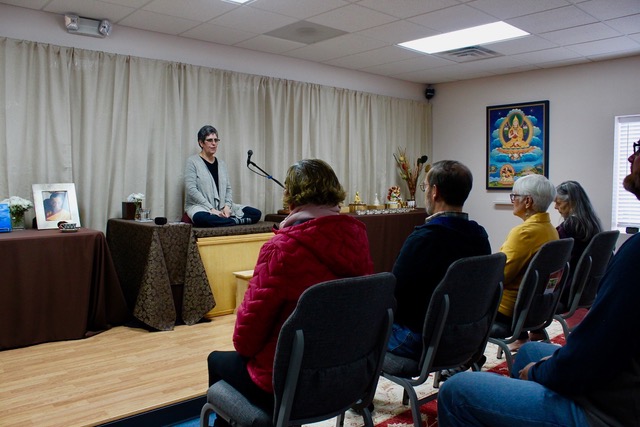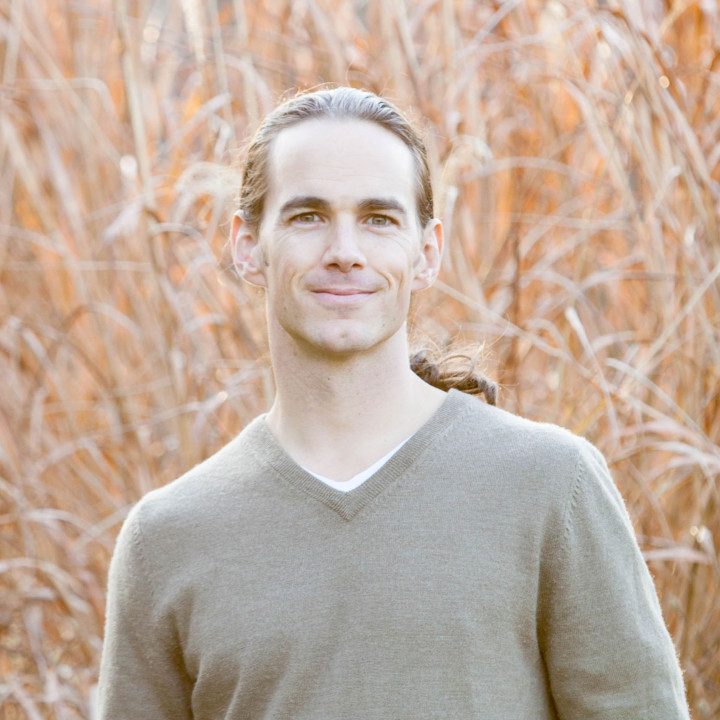Mantra, mindfulness, transcendental, spiritual, walking — while the practice of meditation aims to quiet the mind, choosing from its many different forms can be a mental challenge in its own right. Asheville’s abundance of meditators and meditation centers each take a unique approach, but what do all of these types of meditation have in common?
According to the National Center for Complementary and Integrative Health, four elements unify the majority of meditation practices: “a quiet location with as few distractions as possible; a specific, comfortable posture (sitting, lying down, walking, or in other positions); a focus of attention (a specially chosen word or set of words, an object, or the sensations of the breath); and an open attitude (letting distractions come and go naturally without judging them).”
Sharon Lovich, resident teacher at Je Tsongkhapa Kadampa Buddhist Center in Asheville, suggests that the different types of meditation also share common misconceptions. Many non-meditators, she says, believe that practitioners must be calm to meditate. “It doesn’t matter where you’re starting from. Your mind doesn’t need to be calm in order to meditate,” she says. “The calm comes from meditating. You don’t need any special trait, any special body type, any special characteristic” to succeed at meditation.
Another common error of novice meditators, Lovich continues, is believing that they can develop a successful meditation practice all on their own. For most people, she says, a community practice provides much-needed support. “The group energy carries you,” she says. At home, she points out, there are always distractions: “Your refrigerator is always there.

Mindfulness and meditation
Ronya Banks, founder and lead teacher of Asheville Insight Meditation, defines meditation as “a formal practice where the meditator engages their intentional, open, unadulterated attention.” While all forms of meditation can focus intentional attention, Banks says, her preferred practice of mindfulness meditation is one of the most common found in Asheville.
Mindfulness meditation, Banks explains, is a form of meditation in which the meditator “is focused on awareness of one’s internal and external experience.” By emphasizing self-awareness, Banks says, this approach differs from other forms of meditation that focus on external elements like a mantra or the breath.
But mindfulness doesn’t necessarily involve meditation, notes Dr. Brian Lewis of Integrative Family Medicine of Asheville. When he speaks to his patients about mindfulness, Lewis asks them to consider what brings them “a sense of wonder, awe and gratitude.”
For many patients, Lewis says, mindfulness comes from simple things like playing with their dogs or spending time with friends. He works with patients to “grow that feeling” by incorporating those activities into their regular routines. That’s sufficient for some patients to reap the benefits of mindfulness, he says, but others may want to go deeper through incorporating a formal meditation practice.
However, Lewis cautions people interested in starting meditation to consider the type they will practice. “Some kinds of meditation foster a dissociative state [in which meditators experiences a sense of separation from their body], which can be counterproductive” for some people, he says.
Lewis often recommends somatic meditation, which focuses on feelings and sensations in the body. This practice, he says, can help people reacquaint themselves with their bodies and provide relief for many health conditions related to dysregulation of the autonomic nervous system, including fibromyalgia, post-traumatic stress disorder and anxiety. “Meditation can help address the general state of overwhelm experienced by our society,” he notes.
Yet somatic meditation’s emphasis on the mind-body connection, says Lewis, can also raise problems for certain individuals. “For people with intense past experiences of overwhelm, helplessness, hopelessness, or feeling trapped, that journey back to embodiment can be really intense,” he points out. He suggests that people begin their meditation journey with the help of a skilled facilitator who has a long practice history and an active role in a peer group of practitioners.

Health and well-being
Meditation’s popularity continues to rise, even as experts disagree about its helpfulness. In an October 2017 article in Perspectives on Psychological Science titled “Mind the Hype,” psychologists and cognitive scientists suggested that the hype around meditation is outpacing the scientific evidence. The researchers cited a review indicating that “only around 9 percent of research into mindfulness-based interventions has been tested in clinical trials that included a control group.”
Although some research has indicated meditation’s effectiveness at combating conditions such as chronic pain, high blood pressure, irritable bowel syndrome, anxiety and depression, according to the National Institutes of Health, other studies suggest its benefits are limited. A 2014 review in JAMA Internal Medicine of 47 meditation trials, together including over 3,500 participants, found moderate improvements for anxiety, depression and pain but low to no effect on mood, attention, substance abuse, sleep and weight.

Part of the reason for these mixed conclusions, Lewis explains, is that scientists in the West have primarily studied only isolated qualities of meditation (such as mindfulness) without considering other aspects such as a community of practice and the role of spirituality. But those research limitations, he says, shouldn’t discount meditation’s many benefits. “There is increasing evidence about how a comprehensive lifestyle approach can prevent and reverse illness. Meditation can play a role.”
The rewards of meditation aren’t limited to medical conditions, Lewis adds. “If there’s one pervasive disease of Western society, it’s that we’re always on the go. … Meditation can play a role in relaxation, psychological insight and deeper connection” to the world around us.
Matthew Parkinson, director of Asheville Shambhala Meditation Center and a licensed professional counselor, agrees. He notes that meditation provides people the opportunity to be with themselves, an often difficult task in fast-paced modern society. Everyone experiences a “cacophony of thoughts,” he says, and “sitting meditation is a way to rest with that. Not necessarily to fix it, but to notice it.”
Lovich says the main benefit of meditation is developing “an equilibrium of mind that isn’t dependent on what’s happening externally.” With regular meditation practice, she notes, “the way you perceive things changes gradually. Nothing changes externally, but everything changes.” Meditation, she suggests, can help people see that peace and happiness lie within: “How can I be at peace if my happiness is dependent on other people and external situations?”
Lovich spells out the positive effects of meditation she sees in her community. “The people who have been coming here for a few years, it’s like they have completely new lives. They have the same spouses, jobs, problems, but their perception has changed,” she says. “When your mind is calm and peaceful, so much space opens up.”
Meditation centers in Asheville
Shambala Meditation Center
Je Tsongkhapa Kadampa Buddhist Center
Asheville Insight Meditation
Urban Dharma
Asheville Meditation Center
Asheville Transcendental Meditation Center
Zen Center of Asheville




Before you comment
The comments section is here to provide a platform for civil dialogue on the issues we face together as a local community. Xpress is committed to offering this platform for all voices, but when the tone of the discussion gets nasty or strays off topic, we believe many people choose not to participate. Xpress editors are determined to moderate comments to ensure a constructive interchange is maintained. All comments judged not to be in keeping with the spirit of civil discourse will be removed and repeat violators will be banned. See here for our terms of service. Thank you for being part of this effort to promote respectful discussion.